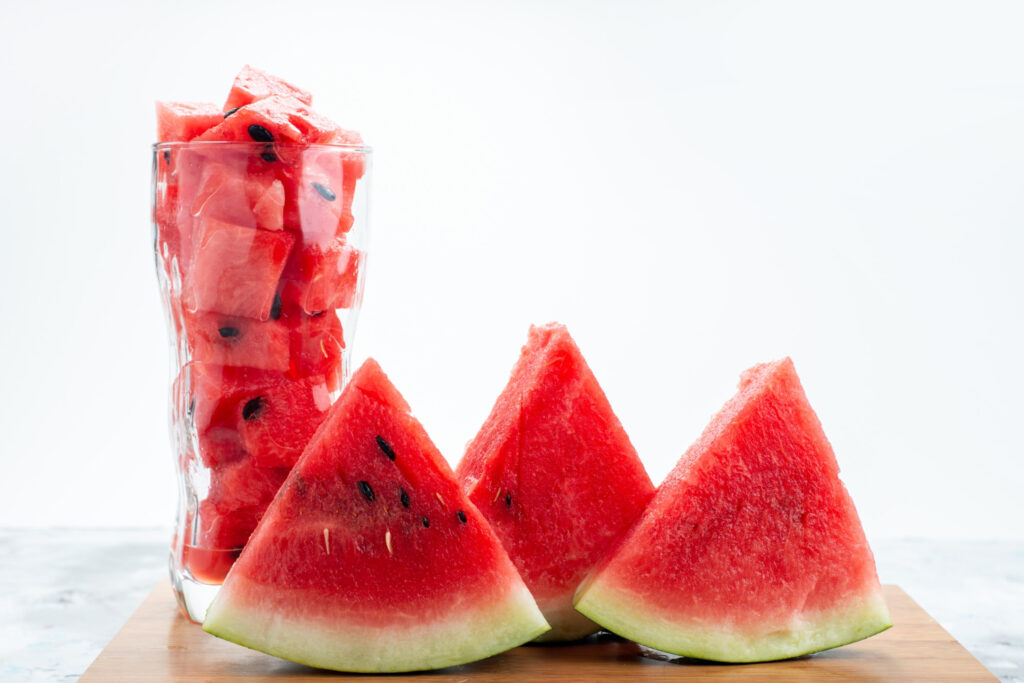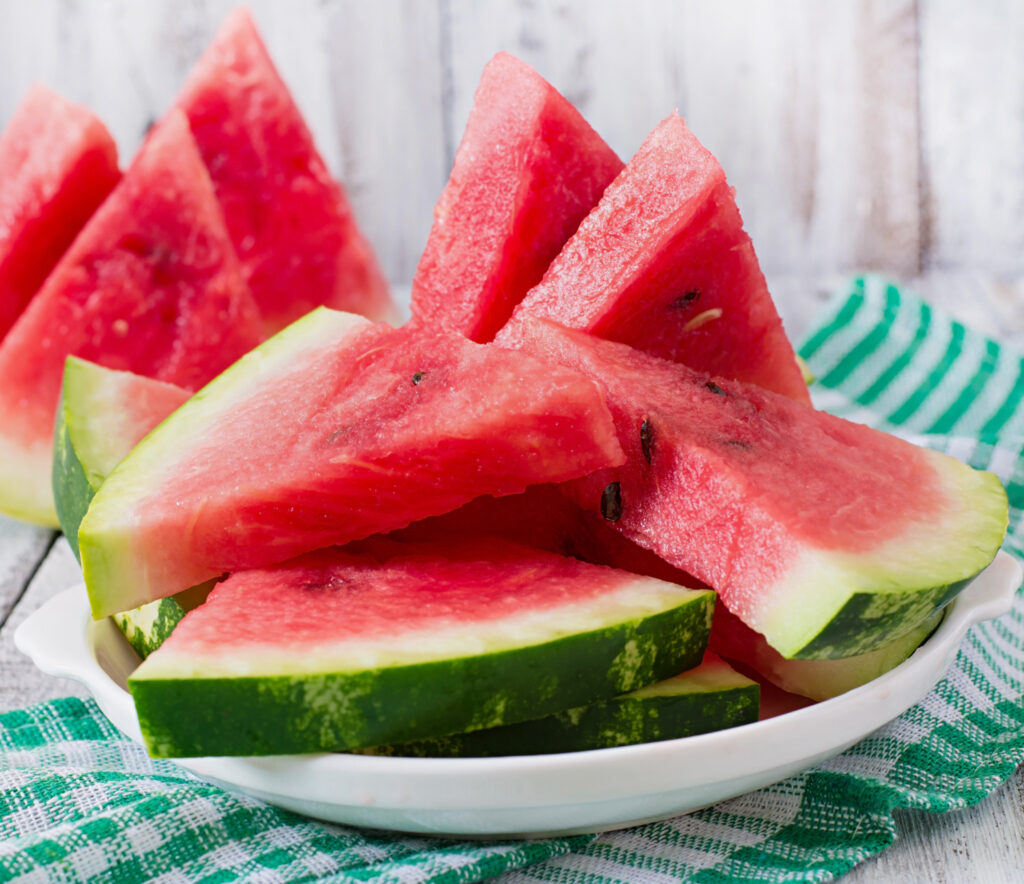
Watermelon is a summertime favorite, a vibrant and tasty fruit that offers numerous health benefits. In this article, we will explore the health benefits of watermelon, tips for selecting a perfectly ripe fruit, and creative ways to incorporate it into meals, snacks, drinks, and desserts.
Benefits of Watermelon
Watermelon is a hydrating fruit packed with nutrients that support heart health, reduce muscle soreness, manage weight, aid digestion, and protect your skin. It may also help prevent various chronic diseases.
Keeps You Hydrated
Watermelon lives up to its name, as one cup of watermelon contains about five ounces of water (roughly the size of a yogurt container). Consuming adequate fluids, including water-rich foods like watermelon, has several health benefits, such as:
- Preventing dehydration
- Regulating body temperature
- Lubricating joints
- Protecting the spinal cord
- Aiding in waste elimination (through urination, sweating, and bowel movements)
Proper hydration also affects mental performance. Research has shown that even a 1% loss of body fluid can impair mood, reduce concentration, interfere with working memory, and increase anxiety

Helps Lower Blood Pressure and Improves Circulation
Watermelon contains L-citrulline, particularly in the white part of the rind. L-citrulline may improve artery function and lower blood pressure by helping blood vessels relax and improving circulation. Some evidence also suggests that L-citrulline can enhance muscle oxygenation and athletic performance during endurance exercise.
Might Reduce Muscle Soreness
A 2017 study found that participants who drank 16 ounces of watermelon juice enriched with L-citrulline two hours before running a half-marathon experienced less muscle soreness for up to 72 hours compared to a placebo group.
Helps Manage Weight
Watermelon can be a great snack for weight management, especially when consumed instead of processed sweets. A 2019 study on overweight and obese adults revealed that those who ate two cups of fresh watermelon daily felt fuller and lost more weight compared to those who ate low-fat cookies with the same caloric content. The watermelon group also saw reductions in waist-to-hip ratios, blood pressure levels, and improved cholesterol profiles.
Supports Digestion
While watermelon isn’t particularly high in fiber, it does contain some fiber along with fluids and prebiotics. Prebiotics stimulate the growth and activity of beneficial bacteria in the large intestine, promoting gut health. They also support immune function, reduce inflammation, enhance mineral absorption, improve blood sugar and insulin levels, and may help protect against colon cancer.
Helps Defend Against Chronic Diseases
Watermelon is an excellent source of lycopene, an antioxidant that combats oxidative stress caused by free radicals. Lycopene helps reduce the risk of chronic diseases, including heart disease, type 2 diabetes, cancer, and Alzheimer’s disease. Traditional pink-fleshed watermelon contains more antioxidants than yellow and orange varieties, making it the best choice for lycopene.
May Protect Your Skin
Watermelon can support healthy skin due to its vitamins A and C content. Lycopene in watermelon may also provide some protection against sun damage, although its effects are not immediate.
Nutrition of Watermelon
One cup of diced watermelon provides the following nutrients:
- Calories: 45.6
- Fat: 0.228g
- Sodium: 1.52mg
- Carbohydrates: 11.5g
- Fiber: 0.608g
- Sugars: 9.42g
- Protein: 0.927g
In addition to its natural sweetness, watermelon is rich in vitamins A and C, potassium, magnesium, B vitamins, and health-protective antioxidants.
Risks of Watermelon
For most people, watermelon is a safe fruit to enjoy in moderation. However, certain individuals should take caution:
- Oral Allergy Syndrome: People with a pollen allergy, particularly to ragweed, may experience tingling lips or an itchy mouth after eating watermelon. These symptoms are usually mild as the body quickly breaks down watermelon in the mouth and stomach.
- Gastrointestinal (GI) Concerns: Watermelon is a high-FODMAP food, which can cause gas, stomach cramps, and diarrhea in individuals with GI issues like irritable bowel syndrome (IBS).
- Diabetes: Watermelon has a high glycemic index (GI), meaning it can raise blood sugar levels quickly. People with diabetes should pair watermelon with low-GI foods to help manage blood sugar levels.
Tips for Consuming Watermelon

To choose a ripe watermelon, look for a yellow or cream-colored splotch on the rind, indicating peak ripeness. A ripe watermelon will also feel heavy for its size. Always wash the watermelon before slicing to remove any bacteria.
Here are some creative ways to enjoy watermelon:
- Combine watermelon cubes with other fresh fruits in a salad, garnished with fresh mint, ginger, or coconut.
- Add watermelon to a vegetable salad or serve over greens with balsamic vinaigrette.
- Skewer watermelon and avocado chunks with lime juice for a colorful snack or appetizer, served raw or grilled.
- Make watermelon salsa with cucumber, red onion, jalapeno, cilantro, and lime juice.
- Blend seedless watermelon with fresh lemon juice and freeze for a refreshing slushy drink.
- Blend watermelon with coconut milk and dark chocolate, then freeze in popsicle molds for a sweet treat.
- Dip watermelon cubes in melted dark chocolate for a delightful pairing.
Watermelon is not only delicious and refreshing but also packed with nutrients that offer various health benefits. Enjoy it as part of a balanced diet for a tasty way to stay hydrated and healthy











